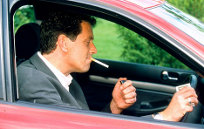SMOKING CAN BE PROHIBITED IN ALL VEHICLES IN THE UK
The Royal College of Physicians wants England's imminent review of anti-smoking laws to include such measures to protect the children. They declare that passive smoking leads to 300,000 extra child visits to General Practitioners in the UK yearly related to such health diseases as asthma and bacterial meningitis.
However driving and smoking lobby groups insist that cars are a “private space”.
A number of medical bodies have supported a ban on smoking in cars transporting children, but the RCP goes a considerable step further, demanding a blanket ban on anyone lighting up in a vehicle - regardless of whether kids or indeed any other passengers are inside.
Several surveys have been conducted by RCP related to the second-hand smoke. As a result Passive Smoking and Children Report has been issued. The report suggests that in the UK, tens of thousands of children get sick as a result of exposure to cigarette smoke.
Therefore RCP is calling for a two-pronged approach which would see children protected from second-hand smoke and shielded from the sight of adults smoking - whether in the playground or on the TV.
It was discovered that second hand smoke causes 300,000 visits to a GP - some of which end up in hospital - costing the NHS £23.3m.
The report does concede that these figures are only estimates, but says it is confident they give an "indication" of the number of children who get sick.
The physicians confess that a ban on smoking at home would be neither politically or practically possible, as it is an intervention in the private sphere of each person, however the car is a mobile vehicle which can interfere with the private space of the other person, who doesn't have to tolerate it.
The report argues that the only way to make it practically enforceable would be to perform it as a blanket ban on all private vehicles - regardless of their passengers, as exemptions would prove too complex.
In addition, it makes recommendations to reduce the burden of passive smoking on children:
- Campaigns to explain to parents the importance of a smoke-free home
- Cigarette tax increases
- Generic cigarette packaging
- Reducing the number and accessibility of tobacco retailers to children, imposing strict penalties on those who sell to children
- Wide extension of smoke free legislation are also among the recommendations issued and so on
“This report isn't just about protecting children from passive smoking, it's about taking smoking completely out of children's lives," says Professor John Britton, head of the college's Tobacco Advisory Group and lead author of the report.
However it is not surprisingly that driving and smoking lobby groups shows their anger at the recommendations, arguing that legally it is prohibited to issue laws regulating every aspect of adult's behaviour.
Simon Clark, of Forest, which campaigns for smokers' rights, questioned the figures used in the report, noting that cases of asthma had been rising as the number of smokers had fallen.
"It's unacceptable to single out smokers and imply that they are solely responsible for the cost of asthma treatments, hospital admissions and asthma drugs for children up to the age of 16.”
"We want smokers to be considerate towards those around them, especially children, but changing people's behavior should be achieved by education and encouragement not by legislation and enforcement."
Nigel Humphries, spokesman for the Association of British Drivers, said the car should be seen as an extension of the home and treated as such. "The car is a private space and it crosses a line to start interfering in it, however much one disapproves of smoking."
Source: 24 March 2010: Passive smoking is a major health hazard to children, says the RCP.

